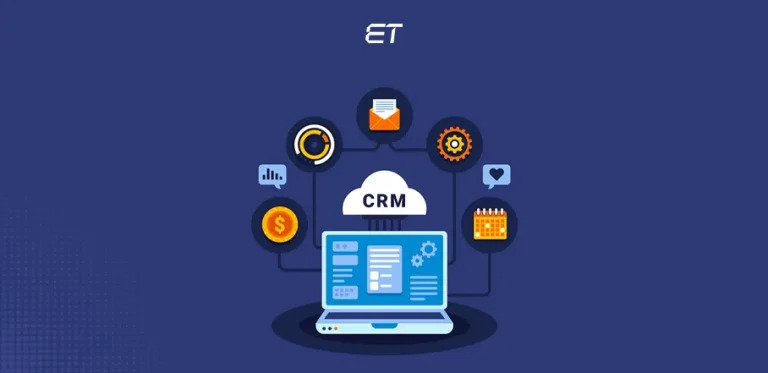
What is B2B CRM Software? Top Tools and Strategies for 2025
Have you ever tried managing multiple client relationships without a clear, organized system in place? If yes, then you know how chaotic things can become. To end this problem, B2B CRM comes in — acting as the central hub that organizes, tracks, and nurtures every client interaction.
B2B CRM software does more than simply managing customer data — it helps you build stronger, more strategic relationships that directly impact your business growth.
In this blog, we’ll discuss what B2B CRM software is, what makes it a must-have for modern businesses, the benefits it brings to the table, and how you can leverage it to stay ahead of your competition. This piece will assist you in unlocking the full potential of your customer relationships.
So, without much ado, let’s get started!
What is B2B CRM, and Why is it Crucial?
B2B CRM (Business-to-Business Customer Relationship Management) is a software designed to manage your interactions with other businesses instead of individual customers. In B2B, client relationships are often long-term, involving multiple stakeholders and complex decision-making processes. A CRM system for B2B simplifies these processes by centralizing data and enabling companies to track every interaction, from sales inquiries to contract negotiations.
Without a proper B2B CRM system, you risk losing track of vital client information, missing out on sales opportunities, and failing to provide the level of service your clients expect.
Curious how the right CRM can boost your sales? Our team has all the answers to your doubts. Explore tailored solutions for your business with our experts!
Key Features of B2B CRM Software
Choosing the right B2B CRM software can revolutionize the way you manage your client relationships. But what makes a CRM system for B2B effective?
Let’s explore some of the important features that help you streamline your business operations, boost sales, and foster long-term relationships with clients.
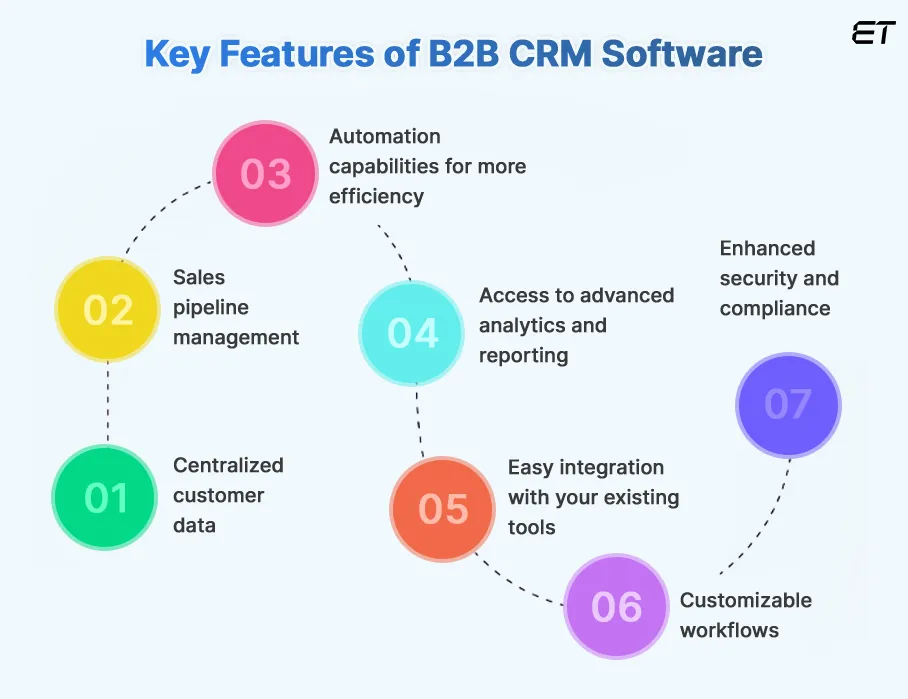
1. Centralized Customer Data
At the heart of any great B2B CRM is its ability to centralize all your customer data. Imagine having a single platform where you can easily access every detail about your clients — from their contact information and past communications to their purchase history and support tickets.
A CRM B2B software provides a 360° view of your clients, ensuring your team has all the information they need to make informed decisions, nurture leads, and deliver a more personalized customer experience.
2. Sales Pipeline Management
One of the standout features of B2B CRM software is its robust sales pipeline management tools. Whether you’re tracking a new lead or managing ongoing negotiations, the CRM allows you to manage multiple sales pipelines to cater to different business needs. This includes a visual sales pipeline, which helps in tracking and managing sales deals effectively.
B2B CRM software gives your sales team greater visibility and control, making it easier to prioritize tasks, follow up with prospects, and ultimately be able to close deals faster.
3. Automation for Efficiency
Managing client relationships manually can be overwhelming, especially when repetitive tasks are involved. B2B CRM software often comes with automation capabilities that handle these tasks for you.
Whether automating follow-up emails, scheduling meetings, or generating reports, automation frees up time for your team to build stronger relationships and convert leads into loyal customers.
4. Advanced Analytics and Reporting
In the B2B space, data is everything. A CRM system for B2B provides powerful analytics and reporting tools to help you monitor performance, track client interactions, and predict future trends. From sales forecasts to customer behavior insights, these reports empower your business to make data-driven decisions.
By analyzing your CRM data, you can identify opportunities for growth, refine your sales strategy, and improve customer satisfaction.
5. Integration with Existing Tools
Your business likely relies on various tools to get things done — email marketing platforms, accounting software, project management tools, and more. A robust CRM system for B2B seamlessly integrates with your existing tech stack, creating a more unified and efficient workflow.
When everything is connected, your team can work more collaboratively, track real-time progress, and ensure no customer slips through the cracks.
6. Customizable Workflows
Every business operates differently, which is why customization is a crucial feature of B2B CRM software. Whether it’s adjusting your sales pipeline to match your process, creating personalized email templates, or setting up custom reports, a flexible CRM allows you to tailor the system to meet your specific needs.
This makes your CRM more efficient and aligned with your business goals.
7. Enhanced Security and Compliance
Handling sensitive client data is a significant responsibility, especially in today’s times where data breaches can have severe consequences. A good B2B CRM offers strong security measures and compliance features, protecting your customer data.
Look for features like encryption, user authentication, and compliance with regulations like GDPR to safeguard your data and maintain trust with your clients.
Looking to implement a B2B CRM that truly aligns with your business goals? Our experts are here to help you and streamline your sales process.
The Strategic Benefits of Implementing B2B CRM
Investing in the right B2B CRM software can completely transform how your business operates, but it’s more than just managing client data. It’s a strategic asset to your business that can drive efficiency, improve sales, and strengthen customer relationships.
Let’s understand the benefits a B2B CRM system has to offer your business:
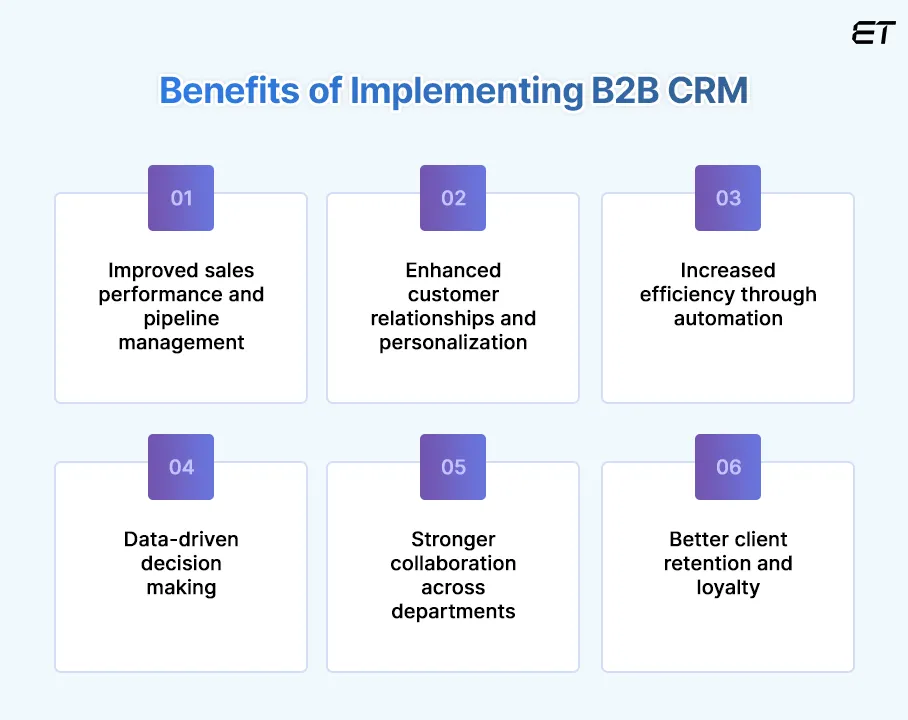
1. Improved Sales Performance and Pipeline Management
One of the biggest strategic advantages of a CRM system for B2B companies is its ability to manage the sales cycle efficiently. These tools also help manage leads by organizing and overseeing sales pipelines, allowing your team to handle lead data comprehensively.
With a clear view of the sales pipeline, your team can easily track where each prospect is in the buying journey, making it simpler to prioritize leads and follow up at the right time. This ensures that no opportunities slip through the cracks and your sales efforts are more focused and effective. The result? Faster deal closures with higher revenue.
2. Enhanced Customer Relationships and Personalization
Building long-term, valuable relationships with your clients is essential in B2B. A CRM system allows you to keep detailed records of every client interaction, enabling your team to offer a more personalized experience.
Whether it’s sending targeted communications, remembering important dates like contract renewals, or addressing specific customer needs, a CRM helps you tailor your approach to each client. This level of personalization not only boosts customer satisfaction but also leads to higher client retention rates.
3. Increased Efficiency Through Automation
Time is one of the most valuable resources for any business, and a B2B CRM helps you save plenty of it by automating repetitive tasks. From sending follow-up emails to generating reports, automation ensures that your team isn’t bogged down by administrative work.
Instead, they can focus on more strategic tasks, such as nurturing high-value leads and closing deals. This increased efficiency helps streamline your operations and reduces the chances of human error.
4. Data-Driven Decision Making
Most of you would agree that today’s business is data; you cannot make decisions based on guesswork. Right? A B2B CRM system provides in-depth reporting and analytics tools that offer valuable insights into your sales performance, customer behavior, and overall business trends. With access to real-time data, your leadership team can make informed, strategic decisions that align with your business goals.
Whether it’s adjusting your sales strategy or identifying new growth opportunities, having this data at your fingertips gives you a competitive edge.
5. Stronger Collaboration Across Departments
In many organizations, different departments — like sales, marketing, and customer service teams – operate in silos, which can often lead to miscommunication and inefficiencies. A B2B CRM breaks down these barriers by providing a centralized platform where all teams can access the same customer information. This encourages collaboration and ensures that everyone is on the same page, resulting in a more unified approach to managing client relationships and driving business success.
Additionally, the CRM helps in aligning marketing efforts with overall business goals, enhancing customer engagement and improving lead management through various digital tools and strategies.
6. Better Client Retention and Loyalty
Retaining clients is often more cost-effective than acquiring new ones, and CRM B2B software plays a vital role in keeping them satisfied and loyal. With features like automated follow-ups, personalized content, and proactive engagement, a CRM helps you stay connected with your clients and address their needs before they even ask.
This leads to improved client retention and fosters long-term relationships, which are essential for sustained business growth.
Are you struggling to choose between ERP and CRM for your business? No problem! Learn how each system tackles unique challenges to streamline operations and boost growth here.
Role of B2B CRM in the Sales Process
A B2B CRM system plays a pivotal role in streamlining the sales process by:
- Automating routine tasks
- Providing valuable insights
- Enhancing customer engagement
By centralizing customer data and interactions, a B2B CRM system enables sales teams to focus on high-value activities, such as building relationships and closing deals. The CRM system also helps to identify bottlenecks in the sales process, allowing sales teams to make data-driven decisions and optimize their sales strategies.
Imagine having all your customer data in one place, accessible at the click of a button. This centralized approach not only saves time but also ensures that your sales team has the most up-to-date information at their fingertips. Whether it’s tracking a lead through the sales funnel or analyzing past sales data to predict future trends, a B2B CRM system provides the tools needed to streamline your sales processes effectively.
Moreover, the automation capabilities of a B2B CRM system can handle repetitive tasks such as sending follow-up emails, scheduling meetings, and generating reports. This frees up your sales team to focus on what they do best—engaging with customers and closing deals.
By reducing the administrative burden, a CRM system enhances productivity and ensures that no opportunity slips through the cracks.
In addition to automation, a B2B CRM system offers valuable insights into your sales pipeline. By visualizing the sales process, your team can easily identify where each prospect is in the buying journey and prioritize their efforts accordingly. This level of visibility and control is crucial for optimizing sales strategies and ensuring that your team is always working on the most promising leads.
Challenges in Implementing B2B CRM and Solutions Overcome Them
While the benefits of B2B CRM software are undeniable, implementing a CRM system for B2B is more challenging than it might seem theoretically. Like any major business transformation, CRM implementation comes with its own set of challenges. Addressing these issues head-on is key to ensuring your CRM deployment succeeds and delivers the expected results.
Let’s take a look at some of the common hurdles you might face when implementing a B2B CRM and how to overcome them.
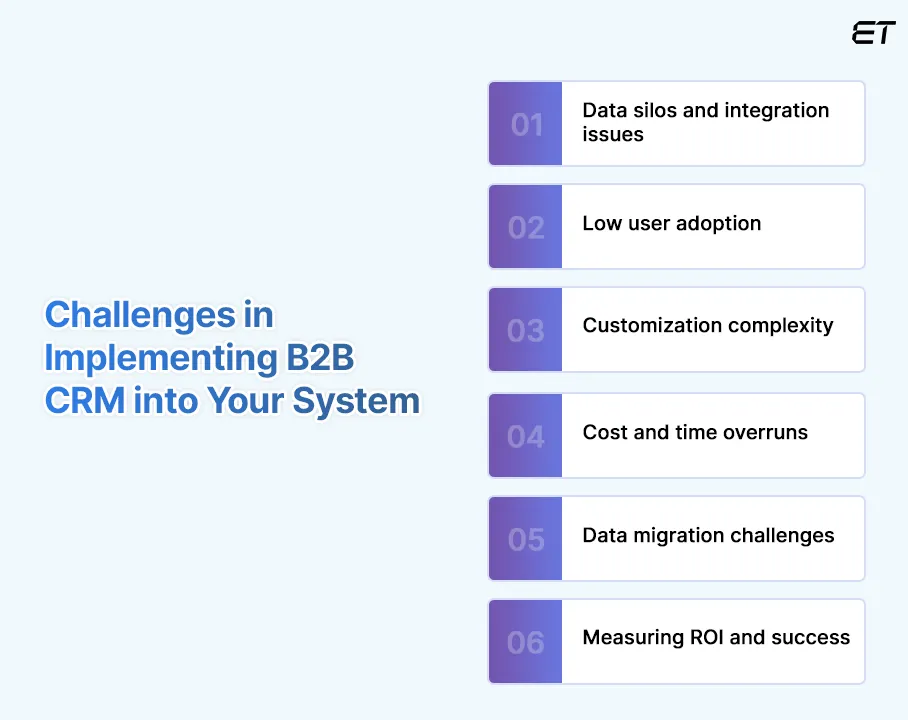
1. Data Silos and Integration Issues
One of the most significant challenges you might encounter during B2B CRM implementation is data silos. When data is spread across multiple systems — sales, marketing, customer support — it becomes challenging to centralize everything in one B2B CRM software. This lack of integration can lead to fragmented data and incomplete customer profiles, which defeats the purpose of having a CRM in the first place.
Solution: To overcome this, ensure your chosen B2B CRM software seamlessly integrates with your existing tools and databases. Before implementation, assess all your current systems and workflows to determine how they will connect with the CRM.
2. Low User Adoption
A common problem with CRM implementation is getting your team to actually use the system. Resistance to change or the perception that B2B CRM software will add up to extra work can hinder its success. After all, no matter how advanced your CRM is, you won’t see the benefits if your team doesn’t adopt it fully.
Solution: Proper training and clear communication are key to addressing low user adoption. Involve your team early in the process, offering hands-on training and demonstrating how the CRM will make their work easier, not harder. Simplifying and tailoring the system to their specific needs will also encourage your employees to use it.
3. Customization Complexity
As previously discussed, every business operates differently, and as a result, B2B CRM software often requires customization to align with specific business processes. However, overly complex customization can make the system difficult to navigate, leading to user frustration and inefficiencies. Balancing the need for customization with simplicity is a major challenge during CRM implementation.
Solution: To manage this, start with the CRM’s core features and customize only the areas that are absolutely necessary. Keep the interface user-friendly and ensure the workflows align with your team’s natural processes so the CRM works in favor of your business, not against it.
4. Cost and Time Overruns
Implementing a CRM system for B2B can be time-consuming and expensive, especially if the scope of the project isn’t well-defined from the beginning. Delays, unexpected complications, or continuous modifications can cause costs to balloon, leaving you with a system that feels more like a burden than a benefit.
Solution: To avoid this, ensure that you have a clear implementation plan in place before starting the project. Define your goals, budget, and timeline upfront, and stick to them as much as possible. Also, work with a CRM vendor who understands your business needs and has a proven implementation process. This will help you keep costs and timelines under control.
5. Data Migration Challenges
Migrating existing customer data into a new B2B CRM system can be one of the most daunting parts of the implementation process. The huge volume of data, combined with the risk of losing or misplacing important information during the transfer, can make data migration a complex task. Inaccurate or incomplete data can result in poor CRM performance and missed opportunities.
Solution: To overcome this risk, start with a thorough data audit to ensure that all information is accurate and up-to-date. You need to work closely with your IT team or CRM provider to ensure smooth migration and test the system thoroughly before going live.
6. Measuring ROI and Success
Once your CRM B2B system is up and running, another challenge is measuring its success and ensuring it delivers a solid return on investment (ROI). Without clear metrics, it can be difficult to determine if your CRM implementation is helping you achieve your business goals.
Solution: To measure the effectiveness of your B2B CRM software, set clear KPIs (Key Performance Indicators) from the outset. These could include metrics like sales growth, improved customer retention, or increased operational efficiency. Track these KPIs regularly to ensure your CRM is delivering the results you expect, and then adjust your strategy as needed.
How Do You Measure the Success of Your B2B CRM System?
Measuring the success of a B2B CRM system is essential to ensure that the system is delivering the expected benefits and to identify areas for improvement. One of the most effective ways to do this is by tracking key performance indicators (KPIs) such as conversion rates, sales velocity, customer satisfaction, and return on investment (ROI).
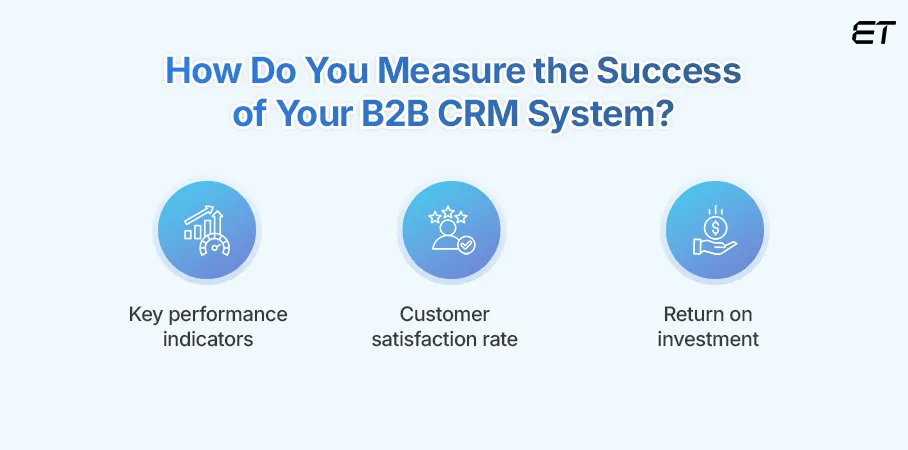
- Conversion rates are a critical KPI that indicates how effectively your sales team is turning leads into customers. By monitoring this metric, you can assess the impact of your CRM system on your sales process and identify any areas that need improvement. Similarly, sales velocity measures the speed at which deals move through your sales pipeline, providing insights into the efficiency of your sales strategies.
- Customer satisfaction is another important KPI that reflects the quality of your customer relationships. A B2B CRM system helps you deliver personalized experiences and proactive engagement, which can significantly boost customer satisfaction and loyalty. By tracking this metric, you can gauge the effectiveness of your CRM system in enhancing customer relationships.
- Finally, return on investment (ROI) is a crucial KPI that measures the financial benefits of your CRM system relative to its cost. By calculating ROI, you can determine whether your CRM investment is delivering the expected value and make informed decisions about future investments.
By regularly tracking these KPIs, you can evaluate the effectiveness of your B2B CRM system and make data-driven decisions to optimize your sales strategies. This continuous monitoring ensures that your CRM system remains a valuable asset that drives business growth and success.
How Do You Choose the Right B2B CRM Software for Your Enterprise?
Now that we’ve covered all the important aspects you need to know about B2B CRM, you must be wondering about which B2B CRM software you should choose, right? Well, this is a crucial decision that you can’t and should not afford to take lightly. With a plethora of options out there, choosing the best B2B CRM software for your business requires careful consideration.
The right B2B CRM can help you boost your business, but the wrong one can leave your team frustrated and your investment wasted. So, how do you make sure you’re choosing the right one?

Let’s discuss that below:
1. Customization and Scalability
Every business is unique, and your B2B CRM software should reflect that. Look for a CRM that allows you to customize workflows, dashboards, and reporting features to match your specific business processes. As your business grows, your CRM needs will too, so it’s crucial to choose a CRM system for B2B that can scale with you. Whether you’re expanding into new markets or adding more team members, your CRM should be flexible enough to grow without needing a complete overhaul.
2. Ease of Use
One of the most significant factors determining whether a CRM will succeed in your organization is how easy it is for your team to use it. No matter how advanced and feature-packed your B2B CRM system is, your team may resist adopting it if it’s overly complicated or requires hours of training. Therefore, prioritize a user-friendly interface and intuitive design when selecting your CRM.
3. Integration with Existing Tools
Your B2B CRM software won’t operate in a bubble; it needs to work seamlessly with the tools you’re already using. Whether you integrate it with your lead generation platforms like email marketing, marketing automation tools, accounting software, or ERP systems, a CRM that fits into your current tech stack will save you time and effort. Therefore, before making your decision, check that the CRM supports easy integration with the tools you depend on daily. This will ensure a smooth workflow and will keep all your systems connected and working in harmony.
4. Automation Features
One of the main reasons businesses invest in B2B CRM software is to increase their efficiency through automation. Whether it’s automating sales follow-ups, lead nurturing, or reporting tasks, look for a CRM that offers robust automation capabilities. These features not only save you time but also reduce human error that any employee is likely to make, ensuring that important tasks never fall through the cracks. The right CRM will help you streamline repetitive tasks, so your team can focus on building strong, long-term client relationships.
5. Data Security and Compliance
Data security is the foundation of the business in the B2B space. Your CRM B2B system will handle sensitive customer data, so you need to ensure it has strong security protocols in place. Look for a CRM that offers encryption, secure access controls, and compliance with industry regulations like GDPR. This will not only protect your business from data breaches but also reassure your clients that their information is safe with you.
6. Vendor Support and Training
Choosing the right B2B CRM goes beyond the software itself—vendor support is equally important. You’ll want a CRM provider that offers strong customer support, not just during the setup process but for the long term. So, look for a vendor who provides comprehensive onboarding, ongoing training, and accessible technical support. A reliable support team can make all the difference when your team encounters an issue or needs assistance with new features.
7. Cost vs. Value
Finally, while budget is always a concern, choosing the cheapest option may end up costing you more in the long run. Therefore, instead of focusing only on price, consider the value a B2B CRM system will bring to your business. Does it offer features that will genuinely improve your sales, marketing, and customer service efforts? Will it save time and boost efficiency? Weigh the long-term benefits against the upfront costs to ensure you’re getting the best return on your investment.
Top B2B CRM Tools and Software You Can Consider in 2025
The right B2B CRM isn’t just a tool—it’s the engine driving your customer interactions, sales processes, and business growth. In today’s competitive market, where every lead counts and customer expectations are sky-high, having a reliable CRM can transform how you manage your business. Therefore, to make your search easier, here’s a deep dive into some of the top B2B CRM tools for 2025, each offering a unique set of features and technical advantages.
1. Salesforce
Salesforce remains a dominant player in the CRM world due to its unmatched flexibility and robust feature set. Its cloud-based platform supports everything from sales and customer service to marketing and analytics. Salesforce’s AppExchange allows you to integrate thousands of third-party apps to enhance your workflow further.
Features of Salesforce are:
- Sales teams can use Einstein AI’s predictive analytics to determine the best course of action.
- It supports REST and SOAP APIs, allowing developers to build custom solutions.
- Workflow rules and process builders automate lead assignments, follow-ups, and data updates.
2. HubSpot CRM
HubSpot CRM is ideal for B2B companies that want an easy-to-use platform for managing leads, sales pipelines, and marketing campaigns. The best part? Its CRM is free, with plenty of features to get you started. It easily connects with HubSpot’s Service, Sales, and Marketing Hubs.
Features of HubSpot CRM are:
- Know when leads open your emails and use customizable templates for faster outreach.
- It offers a visual breakdown of team performance and sales activities.
- Hubspot CRM easily creates automated workflows without writing a single line of code.
3. Zoho CRM
Zoho CRM is an excellent choice if you’re looking for a cost-efficient yet powerful tool. It supports multi-channel communication, including email, phone, live chat, and social media, all within a single platform. With Zia, its built-in AI assistant, you can get predictions on lead conversions and sales forecasts.
Features of Zoho CRM are:
- To automate repetitive tasks, you can write functions using Deluge, Zoho’s scripting language.
- It connects you with over 500 apps, including G Suite, Office 365, and Slack.
- You can visualize your sales process and enforce compliance with specific sales steps.
4. Microsoft Dynamics 365
Microsoft Dynamics 365 combines CRM and ERP functionalities into one platform, making it a robust solution for large-scale enterprises. It leverages AI to provide actionable insights and automates customer engagement processes.
Features of Microsoft Dynamics 365 are:
- Its Sales Insights feature recommends optimal actions based on historical data.
- It works natively with Outlook, Excel, and Teams for enhanced productivity.
- It builds custom apps for your team without the need for extensive coding.
5. Pipedrive
If your primary focus is sales, Pipedrive is explicitly designed to help you close deals faster. Its visual pipelines make tracking progress easy, while the AI-powered sales assistant offers recommendations to optimize your workflow.
Features of Pipedrive are:
- It automatically assigns tasks, updates fields, and moves deals between stages.
- Pipedrive’s integrated lead scoring helps you prioritize high-value prospects.
- It connects seamlessly with tools like Zapier, Slack, and Trello for better team collaboration.
6. Freshsales (by Freshworks)
Freshsales stands out for its clean interface and robust lead management features. It’s designed for B2B sales teams looking for a CRM with built-in communication tools and leads scoring based on interactions.
Features of Freshsales are:
- Freshsales’ Freddy AI scores lead based on engagement, helping you focus on the right prospects.
- The CRM allows you to make and record calls directly.
- It automates repetitive tasks such as sending follow-up emails or updating records.
7. Monday Sales CRM
Monday Sales CRM allows your teams to customize workflows with ease, making it a popular choice if you value transparency and flexibility. Its visual dashboards make tracking sales and project progress a breeze.
Features of Monday Sales CRM are:
- Create “if-then” automation rules to streamline tasks.
- You can use its templates to create personalized sales pipelines.
- With Monday Sales CRM, you can now assign tasks, set deadlines, and update statuses—all in one place.
8. Insightly
If you need a mix of CRM and project management capabilities, Insightly delivers. It allows you to manage customer relationships while keeping track of project milestones and deliverables.
Features of Insightly are:
- It automatically creates tasks, sends emails, and updates project statuses.
- It maps out connections between leads, contacts, and organizations.
- It supports integration with tools like QuickBooks, Slack, and Mailchimp.
9. Copper
If your team heavily relies on Google Workspace, Copper can save you time by effortlessly syncing your data. It integrates directly with Gmail, making lead and contact management as simple as using your inbox.
Features of Copper are:
- It automatically logs customer interactions from Gmail.
- You can personalize emails at scale with ease.
- With easy drag-and-drop capability, it gives you a visual representation of every sales transaction you’ve made.
10. SugarCRM
SugarCRM is for businesses that want complete ownership of their CRM, whether on-premise or in the cloud. It’s known for its highly customizable nature, making it ideal for teams with complex workflows.
Features of SugarCRM are:
- It enables deep customization and integration with other platforms.
- It uses machine learning to anticipate customer needs and improve engagement.
- It ensures secure data access with user-specific permissions.
These B2B CRM tools help manage contacts and empower you to refine your customer journey, automate tedious tasks, and improve team collaboration. Whether you’re a startup looking for cost-effective solutions or an enterprise needing advanced automation, there’s a CRM here for every business goal. Take your time to evaluate your business needs and pick a tool that sets you up for success in 2025 and beyond.
Wrapping Up!
Before we wrap up, let’s quickly recap what we discussed previously in this blog:
- A B2B CRM software centralizes customer data, streamlines your sales pipelines, and automates tasks, helping you manage client relationships effectively.
- Key benefits of CRM software for B2B include improved sales performance, personalized customer experiences, and better collaboration across departments.
- Implementing a CRM comes with its set of challenges like data integration and user adoption, but if you plan it carefully, you can ensure a smooth rollout.
- Choosing the right B2B CRM involves selecting a solution that aligns with your business needs, is scalable, and the one that integrates seamlessly with your existing tools.
Last but not least, remember choosing the right B2B CRM isn’t just another checkbox for your business; it’s an opportunity to build stronger relationships, improve your business efficiency, and stay ahead in the market. The right CRM can unlock potential you didn’t even know existed.
If you’re looking for expert support in optimizing your B2B CRM choices and software management, we are here to help you out! Reach out to our experts now for any queries or support related to B2B CRM and streamline your business operations.
Frequently Asked Questions
1. What is a B2B CRM?
B2B CRM (Customer Relationship Management) is a platform that helps you manage your interactions with other businesses by centralizing customer data, automating tasks, and tracking your sales pipelines.
2. What is the difference between B2B CRM and B2C CRM?
The primary difference between B2B CRM and B2C CRM lies in the nature of the relationships they manage. B2B CRM is for businesses that sell to other businesses, focusing on long-term, complex relationships involving multiple decision-makers and longer sales cycles. Meanwhile, B2C CRM is built for businesses that sell directly to individual consumers and manage large volumes of short, transactional relationships.
3. How do I choose the right B2B CRM for my business?
While choosing the right B2B CRM for your business, look for aspects like ease of use, scalability, integration with existing tools, and customization options according to your industry needs. It should also align with your long-term business goals and be supported by reliable vendor assistance.





